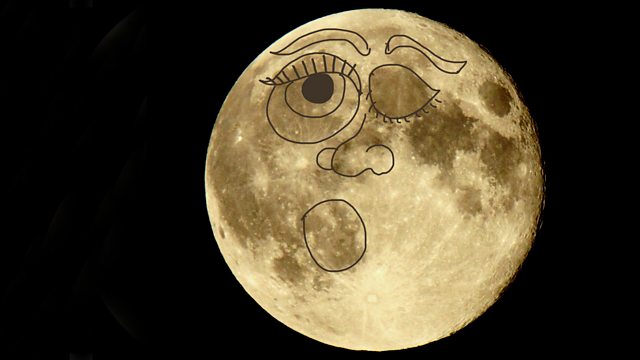
Smashing into the Moon
The Moon; Brain mapping; New Antibiotics; Preserve taste of local french cheese; iPhone blocking; Faster, better, cheaper space; Viking 1; Honeyguides; London Pavement Geology
The Moon’s pock marked face is testimony to the violence of its history – pounded by huge lumps of space rock that have carved out deep craters in its surface. The most impressive is the Mare Imbrium which is a huge black basin that takes up around a tenth of the face we see. According to the paper Nature this week, the impact that created it was even bigger than previously realised. The geologist who worked that out, Peter Schulz of Brown University, talks to Roland Pease.
Brain Mapping
A new brain map, based on multiple scans of more than 400 individuals, has carved the "cortex" into 180 different compartments - 97 of which are new. This crumpled outer layer of the brain is home to our advanced cognition, perception and movement. It has been mapped in various ways for centuries, but this new effort is a landmark attempt at a definitive, modern atlas for neuroscientists. The work is reported in Nature and the data is available to scientists online.
New Antibiotics
Most of the antibiotics we use were discovered in the mid-20th century, but as the threat of drug resistant infections increases, the race is on to find new organisms that make novel medicines. We have only identified a tiny fraction of the microbes living on Earth and are "bioprospecting" for useful ones in wildly different locations. Microbiologist Matt Hutchings from the University of East Anglia in England, has been looking to the oldest farmers in the world - leaf cutter ants, and Adam Rutherford asked him how ants can culture antibiotics.
Preserving the Taste of Local French Cheese
The taste, smell and appearance of a cheese come from the native bacteria in the initial raw milk. Due to increasing regulations for milk pasteurization, cheeses are losing their particular flavours and authenticity. In Normandy, in France, cheesemakers started working with researchers to set up a microbial bank in order to save the microorganisms responsible for the cheesy flavours.
Will Apple's New Patent Push Delete on Ability to Record Police?
Apple has patented a tool which may be able to use a laser to block smart phones from recording footage. Might this be used by police forces in the future to stop citizens from recording overzealous policemen carrying out arrests and using force beyond that which is reasonably required? Gareth Mitchell hears from Nicole Ozer from the American Civil Liberties Union.
Faster, Better, Cheaper Space
Dr Kevin Fong recounts the ups and downs of NASA’s Jet Propulsion Laboratory. The story begins in the early 1990’s, when NASA was in a very different place from the glory days of the Apollo era. Still dealing with the fall-out from the Challenger accident and other problems with its unmanned missions, the agency’s budget was significantly cut back. Its new administrator, Daniel Goldin, was forced to adopt a very different and riskier approach to space exploration, one that was in many ways anathema to the NASA’s engineers and scientists: it was dubbed: Faster, Better, Cheaper. But this approach came at a price and would lead to nearly a decade of failures as the cost-cutting took its toll. Kevin talks to NASA experts, including Robert Manning, chief engineer of arguably, the most ambitious and successful of all their planetary missions, Mars Science Laboratory, which landed the Curiosity rover on the surface of the red planet in 2012. How did they overcome repeated failures to achieve this remarkable success? And what can that experience teach us about delivering better healthcare?
Viking 1 on Mars
Forty years ago this week, Viking 1 touched down on Mars, humankind's first lasting presence on another planet. We talk to the mission scientists past and present on exploring Mars, and what it means for life on Earth, and beyond.
Honeyguides
It is known that the bird the Greater honeyguide works with local African villagers to show them where to find wild bee nests and their honey stores. But new research has shown that the birds respond more, and are more likely to find a hive when the human honey-hunters use a special call.
London Pavement Geology
Dr Ruth Siddall from UCL and London Pavement Geology takes Roland Pease on a whistle stop tour around London. They check out some geological sites, and there is not a mountain, river bed or quarry in sight. They see granite that has been impacted by comets, 400 million year old squid fossils on the steps of St Paul’s, a Jurassic beach right here at the ���˿��� and finish with a geological pub stop.
(Image caption: ‘The Man in the Moon’ - open eye is Mare Imbrium crater © ���˿���)
The Science Hour was presented by Roland Pease with comments from ���˿��� Science reporter Jonathan Webb
Producer: Robert Thompson
Last on
More episodes
Previous
Broadcasts
- Sat 23 Jul 2016 08:06GMT���˿��� World Service Australasia
- Sat 23 Jul 2016 22:06GMT���˿��� World Service except News Internet
- Sun 24 Jul 2016 01:06GMT���˿��� World Service Australasia
- Sun 24 Jul 2016 11:06GMT���˿��� World Service except News Internet
- Mon 25 Jul 2016 05:06GMT���˿��� World Service South Asia
Podcast
-
![]()
Unexpected Elements
The news you know, the science you don't

